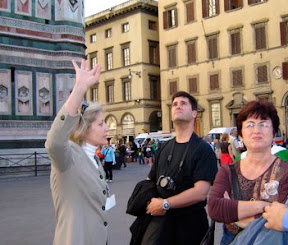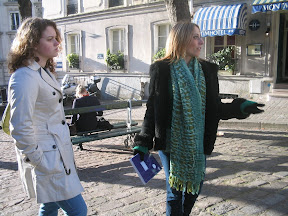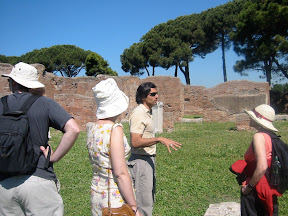Learning deeply about a culture and the history of a place is difficult when you're traveling - often, there isn't enough time to delve deeply into where you are. One way that I've found that can circumvent this disparity between what you want when you travel, and what is actually possible to do, is a unique organization called Context Travel. Context was founded in Rome, Italy in 2002 as a collaborative of architects, art historians, and
archaeologists who organize and lead small-group walking seminars of museums and historical monuments. I was lucky enough to sit down and talk with Context Travel founder Paul Bennett. Here's what he had to say...
WE: Tell us a little bit about Context Travel...
PB: Well, Context is a group of scholars and specialists from a variety of fields (architecture, art, journalism, etc.) who live in cultural capitals around the world (Paris, Rome, New York, etc.) and, in addition to their normal work teaching or writing, design and lead small-group walking seminars of these cities and their treasures. Our walks, lasting anywhere from three hours to several days, attempt to contextualize the built environment, monuments, or museum objects in a larger discussion of history and culture. Most of the "docents" who lead our walks have extensive teaching experience, and our
approach--interactive, conversational--is very much modeled on the Oxford or St. John's seminar approach.

WE: What led you to choose the cities you're currently offering seminars in?
PB: We began in Rome six years ago because this is where my wife and I were based. I was working as the Italy correspondent for Architectural Record
and began leading walks of the city's gardens and Renaissance palaces. People began asking me to do things outside my area of specialty, visits to art museums, archaeological seminars, and so forth. Luckily, Rome is a magnet for these kinds of intelligent people who are here teaching in study abroad programs, on a research grant, living at the American Academy. And so, we began to create a network.
Expanding to Florence and Naples was very organic: Many of our customers visit those places, and they eventually pressed us to recruit scholars there.
Many of our docents are quite mobile. They may spend 2-3 years in Rome on a grant and then get a teaching position in New York or London. This is how
our expansion to Paris, London, and New York happened: We woke up one day and realized that we had quite a network of people in these places. By
then, our reputation had grown so that people began writing to say, do you have any scholars in ... Venice was a top request.

WE: What topics do you cover, in your seminars?
PB: We cover any topic that's deeply related to the city. So, for example, in New York we have seminars on Modern Architecture, Immigration, and Ethnic
Food, as well as walks of the city's great museums. In Paris we run seminars on medieval churches, art galleries of the Marais, the history of high cuisine,
and the patrimony of the Louvre, Orsay and other museums. We are also always looking to expand travelers' knowledge of these cities with opportunities to dig below the surface with new, innovative programs like our Ecology of Venice walk, Dante Seminar (Florence), and Pizza Making Workshop in Naples.

WE: Who are your docents?
PB: Mostly scholars either teaching in universities or working on their dissertations. We also have many non-academic specialists, like architects and journalists and artists and culinary professionals.
WE: Do families participate in your seminars? What about people with disabilities?
We have a whole program of family walks designed for people with children. These include focused activities such as treasure hunts for younger children,
sketching activities, and lots of on-site learning. The docents who lead these programs are all trained in VLS (visual learning strategies).
People with disabilities are welcome on our walks. If the disability means that they can't physically participate in a group walk (e.g. an electric wheelchair
in the Roman forum) we ask that they do something privately so that it can be tailored to their needs.
WE: Are there ways in your seminars of giving back to the community?
PB: We have only a couple of voluntourism programs. The next one is this fall with a seminar on the Tiber river led by myself and Tom Rankin, an architect in Rome. As part of that we'll do a clean up project along the river. Mostly, though, people give back by donating to the Context Foundation for
Sustainable Tourism which invests, in turn, in projects that mitigate the negative effects of tourism and promote its positive impact. On the latter, our newest project--a travel fellowship for economically disadvantaged students from American inner cities--might be of particular interest to your readers.
WE: Thanks so much, Paul! I see you have pizza making in Italy, and a new History of Science walk, in Florence. Context Travel is such an incredible company, providing extraordinary experiences. I am sure our wandering educators will truly enjoy your opportunities!
For more information on Context Travel, please see: www.contexttravel.com
All photos provided by Context Travel.
